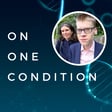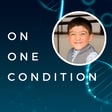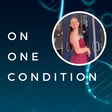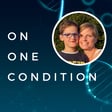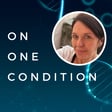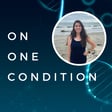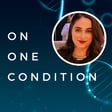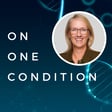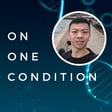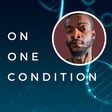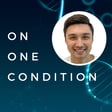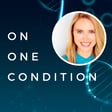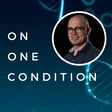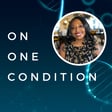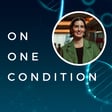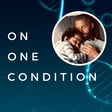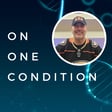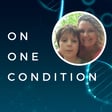Become a Creator today!Start creating today - Share your story with the world!
Start for free
00:00:00
00:00:01

Episode 53: Jocelyn Wong - Morquio Syndrome
Jocelyn shares about living with Morquio Syndrome, a rare skeletal disorder. Her journey started in Hong Kong, where she spent part of her childhood, before moving to the US. Jocelyn reflects on the different approach to medicine between both countries, which partly led her to become a writer and patient advocate. She shares her struggles and triumphs, shedding light on a condition many may not understand. Her candid discussion highlights her resilience, the value of medical advancements, and her hope to inspire others.
The song that Jocelyn chose is Silence is Golden by Leslie Cheung.
Transcript
Introduction to 'On One Condition'
00:00:00
Speaker
Hi, I'm Sylvain Bertolo, and you're listening to On One Condition, a podcast to raise awareness about health conditions by listening to people who leave them every day. My guest today is Jocelyn Wong, and we're going to talk about Morchio Syndrome. Hi Jocelyn, nice to have you on the podcast. How are you doing? Thank you for letting me join you also today.
00:00:26
Speaker
No problem at all. And I'm really looking forward to our discussion.
Jocelyn Wong on Morquio Syndrome Introduction
00:00:30
Speaker
ah But as you know, I love starting with a song. So what song did you choose and why? um The song that I chose is Silent Is Golden from by Leslie Chong. Actually, it emphasized the wisdom of the staying calm and the silent and difficult situation. And the reason it's so different is because experts think that the melody is so soft.
00:00:54
Speaker
And the second thing is, if the word in the song is telling you how to stay calm in this bad situation and thinking on the other way, that made me easier to calm my mood and make by my mindset much easier. and Nice. I like that. It's difficult to stay calm i actually in difficult situations, but usually when you're not calm, you don't react in the right way. So yes, I like
Impact of Morquio Syndrome on Health
00:01:25
Speaker
that. i like that
00:01:27
Speaker
So today we're talking about Morquio syndrome. When we were talking about you joining the podcast, you explained to me that Morquio affects your muscles. So would you be able to describe what impact it has on your muscles and how it affects your body in general? Morquio syndrome, it is scaracle deforms. It means when I was born, all the scaracle, it's not really correctly align it. And therefore, the muscle may be so visible. I mean, it affects the joy, it affects the joy and the motion visibility, and also restrict the mobility. That's why, I mean, it increase the muscles for gel.
00:02:17
Speaker
the muscle cannot really join together. I need more a support of that. And when I walk later, it really different, I don't really it remember it as that much. The only thing is the loudly, the loudly that I have the first surgery for the co-wetting surgery. After that surgery, I was able to walk. But during the weather train, I have a lot of pain. But I think most people in,
00:02:47
Speaker
I should know that you to use some kind of um herbal medication, herbal medication to release the joint pain. Okay. So because of those joints and the fact that the muscles and and the bones don't really join together well, I understand that it has multiple effects on your body. Could you share what kind of symptoms you have?
00:03:19
Speaker
Um, like for example, I cannot open the bottle. I cannot treat the bottle cup of the cap of the bottle. It's hard for me to open the can. I can is so physical. So I don't have really have this power. I have a string on my hand. Okay. Is that the same all around your body that you don't have much muscle strength? Yeah.
00:03:46
Speaker
Okay, wow. And also the fingers as well. Also the finger as well. Yeah, okay. How about walking? Does it impact your mobility? Walking also because the bone is not really straight at all. It's not really connected together. And that's why it's easy to get located. That's why when walking, it leads the muscle to support, the whole body support. And that's why it gets tired really easily.
00:04:15
Speaker
when i was later but somehow some people maybe fool are maybe maybe unbalance but i don't really have but kind of thing at all and i wo little it i remember but no okay So we talk about hidden disabilities a lot on the podcast. In your case,
00:04:35
Speaker
dwarfism is a visible difference. um And I've read about dwarfism and some people consider it a disability, others don't. So first of all, do you consider it a disability yourself? And did it have any impact on your upbringing?
00:04:56
Speaker
i sure I don't, because I've formed it, I carry it on my own. In fact, I don't really really think I have any difference of being. And I went to the regular school, so compared to other classmates or people that I have, I'm about the same. I didn't go, I didn't have the special school
Education and Surgery Experiences
00:05:16
Speaker
or education at all. And because, you know, at the 90, I mean, at the time I was born, like,
00:05:25
Speaker
The parent, I mean, and that doesn't have a lot of money, special education. yeah And even the people have the, have very negative thinking about a special school, special education. They are thinking the people who are like maybe have intelligence in pay or something like that. That's why, and my parents didn't even want me to go there.
00:05:51
Speaker
No, okay. It's also impacted your vision and your hearing. Yeah, that's why I have corneas on front. Okay, well. Because both of you have, more of you are causing the calicormia. The calicormia and calicormia affect the vision. Even the doctors say no in when I was little, but still they think It affected, but at that time, but and when I was around the kids, I mean, the doctor didn't even know how to treat it. They don't even think it, maybe the glaucoma, something, they don't even think it be work. Until the NSAID repair study became out, it can stable the G8, the sugar. I mean, I'm the one of the very few molecule have the coronary transplant even today. Not many people have that surgery.
00:06:45
Speaker
Okay. ah How do you navigate the world then with having some hearing impairment and visual impairment? Do you have any issues navigating the world in general? now he No. no at all ah You talked earlier about surgeries. Yes.
00:07:10
Speaker
Could you tell us a bit more about what those surgeries were focused on, and why did you have so many surgeries? Oh, surgery for the need correction, the need correction. There's more surgery when I was very young for a skeleon its table lie is stable light ah the the spinal nerves.
00:07:32
Speaker
I think, don you know, when the nurse expect it, it all the body, it all the body, it will be, it will be as bad as even beating something like that. That's why um I have those skeletal surgery to support my, to able to make me grow better for the, for the, for the spine, something. Okay. So did those surgeries help with you being able to walk?
00:07:59
Speaker
What kind of impact did it have for you? It could support my spinal cord. That's why I didn't expect on the nerves. That's why I still able to walk and breathe and do a lot of things today and more independently. But for most people, they maybe be lighter on the wheelchair, not able to walk.
00:08:19
Speaker
okay wow and fifth And later on because I had the hip replacement that also without the pain of the number of the number that I have. Mostly because small creole because they didn't have to, they may not have the surgery. I just um have all the orthopedic surgery. So there's one aspect and also expect the spinal cord. So they caught a lot of pain.
00:08:46
Speaker
and they may not be able to walk and rely on the wheelchair in a really young age. Yeah. well So does that mean that your if you hadn't had the surgeries, would your spine not be able to hold your body? Yeah, totally. It cannot be able to hold ah hold the whole whole body. And also when I was little, because I was living in Hong Kong, they've got the li you know Hong Kong is really small speed, living speed, really tiny.
00:09:18
Speaker
yeah That's why it's impossible for me to get a wheelchair or something. That's why I had to walk. thin i want like It forced me to walk all the time. That's one of the ways I didn't rely on a wheelchair or other equipment for that.
Managing Morquio Syndrome with Treatment
00:09:37
Speaker
Outside of the surgeries, do you have access to any treatment to treat more cure or your symptoms?
00:09:47
Speaker
I think the other treatment is today for the anthroepilin therapy with this one, the anthroepilin therapy. This is the four-hour infusion. I had that in 2012, so almost like 12 years. So you have, every week you have a four-hour infusion? Yeah. Wow. And what's the infusion for?
00:10:13
Speaker
It's a medication that helps to resolve the NSAID. The NSAID that more people lock up. Okay, so if I understand correctly, it's to provide an an enzyme that your body doesn't doesn't um create naturally. Yeah, because it does. Antivirus therapy is only a web monquil, only a poor fall in 2014, so not a long time. It's only new treatment. Yeah, yeah. and It sounds like you benefited from that treatment as soon as it was available, is that right? yeah Yeah. Some people think it's benefit, but some people didn't. But in my case, actually, I had no idea why I still wanted it.
00:11:02
Speaker
They could ask, I know that not many countries have to answer the treatment therapy for more care. That's why I just want to be kind of like passing on myself to see if that work or not. And I don't know that you know that in some countries in Asia, they may even say, oh, because the medication may not good for the Asian.
00:11:29
Speaker
It may not be good information, though the government didn't approve or let the medication in. And I would like kind of like telling the people that I am Asian, and who and I have this kind of treatment, and it's so important. And how come they cannot delight the people in their country that they cannot have?
00:11:51
Speaker
the yeah
00:11:56
Speaker
I mean, we might enter into politics here and I'm i'm very bad at that topic. Okay.
00:12:06
Speaker
okay And do you do anything else apart from the enzyme replacement therapy? No other treatment. I think the only the acupuncture and and um the muscle acupuncture I had during the treatment.
00:12:21
Speaker
Okay. I'm pretty lucky to have that because many hospitals have that kind of thing in the wire of the infusion. Yeah. ah What does the acupuncture do? The acupuncture is kind of release the stress of the muscle.
00:12:38
Speaker
Because as I told before, as you asked before, the muscle, um how it affects the muscle muscle, it has to be very tight to support the skeleton, that that to the bone. And ah and sure usually they do the little porn to relieve the stress of the muscle. And we did kind of without the pain. Okay. It's more painful. like Can you feel pain in your muscles? Yes.
00:13:07
Speaker
yeah Most of us do because they could enjoy already not really currently alive together. And also some people have had this spinal cord problem. That's why I call a lot of pain. And that is one of the reasons most people they don't really, they rely on the wheelchair and not activated. Nobody walking or doing something independently though.
00:13:33
Speaker
How bad is the pain? Is it a very sharp pain or is it more of a like constant? Conical pain. Yeah. tol fain Do you take any medication for that or is it or is the acupuncture helping with the pain? Actually, I don't really feel pain. I don't feel any therapy at all.
00:13:55
Speaker
I said, I don't have pain on it. I don't know if that because every week I have to answer the payment therapy and also the, um, I don't know. The pain, um, the Canada. So the pain medication, that's why I do, I do, I do take it every week. That's why I do have all the acupuncture muscle. And maybe that's one of the reason why I don't but frequently have had that had the pain medication.
00:14:22
Speaker
Yeah.
Advocacy and Awareness Efforts
00:14:23
Speaker
Well, I would like to talk about something different because you told me that you you wrote a couple books about yourself. Yeah. So first of all, could you share what books you wrote, what the the title of the books? Actually, the book is really... I'm one of the very few people. I mean, few people in Hong Kong.
00:14:52
Speaker
they invite me to do the book, to write a chapter. I'm not really at the whole book, but only for one chapter. And they asked me to share the story, so I just wrote it to them. And then somehow they invite me. They asked me again in 10 years later, so I wrote any other chapter.
00:15:19
Speaker
yeah So it's to to raise awareness. Yeah. Yeah. What led you to move from Hong Kong to the U.S.? Actually, my parents sent me to send to send to send me to move to the U.S. And I think, you know, that in Hong Kong, a lot of people moving around, even in the 90s and even we stand. OK.
00:15:47
Speaker
And my parents, had the up because i had I already have family in the US, they to send me to study here. Yeah, okay. Did you see any difference between Hong Kong and the US ah having a rare disease? Well,
00:16:06
Speaker
when i When I first came here, when I was teenage, when I was teen in the middle school, I didn't go to any doctor in the U.S. So I don't really think the difference between because, but in Hong Kong, because I didn't go to doctor. and And you told, and you asked me before the upbringing, when I read the aspect, actually, I didn't really go to a lot of doctors in Hong Kong. I only go for the other period, in if in ah um more one year, only one research, year.
00:16:36
Speaker
And then, well, when I moved to the U.S., I didn't, first, the insurance, I don't have insurance in the U.S. when I came. That's why I didn't go to the doctor. Until 2000,
00:16:53
Speaker
until after my hip replacement, And I went to the, um, clinical trial for treatment, but in therapy and, and that's that to have all kinds of doctor wishes and a new treatment for that. Okay. I think that's the only difference from Hong Kong to hear the medical.
00:17:17
Speaker
Yeah, okay. Did you have all your surgeries in Hong Kong? Or did you have some of your surgeries in Hong Kong? I had two surgeries in Hong Kong, the knee surgery. Okay. The only, the two knee surgery when I was five and 11. Oh, okay. The only two knee surgery and most other surgeries are in the US. And at that time, and you asked me about why I wrote a book. I wrote a book because They're trying to tell the people in Hong Kong that not all my all my treatment or surgery is done in the U.S. is possible to do in Hong Kong. Okay. Interesting. Because a lot of people in Hong Kong, and I heard that they say, oh, they cannot debate. They kind of like, oh, the U.S. is better, blah, blah, blah, or something like that.
00:18:11
Speaker
I think that I'm the talent to share with the people that are telling the people that I will in Hong Kong have all those surgeries. So they can be able to have those surgeries in Hong Kong as well. if the day Do they be willing to go for it? ah Yeah, so it's
Healthcare Perception in Hong Kong vs. U.S.
00:18:31
Speaker
interesting. so you Correct me if I'm wrong, but you're saying that people in Hong Kong have a tendency to think that like surgeries or other types of medicinal treatments are not good. And they say that the Hong Kong medication during the colonial time, the doctor would change it by the UK. That's why it's very different. Okay.
00:19:01
Speaker
That's interesting. So a lot of the treatments are done through homeopathy or what we call alternative medicine then. Is that right? Correct.
00:19:13
Speaker
Yeah. But now, now you're the living proof that you can combine treatments with your enzyme replacement incision. It may not be available in Hong Kong, but I think that the earlier time and the time in ah in a kid time, all the surgery is helpful. Yeah. It improved the quality of lipomorchial.
00:19:37
Speaker
Yeah. Okay. And a lot of small people today, some of the small people, they may not have to answer. Most people, they don't have to answer with payment therapy, but ah you they still live today. Yeah. That's why. Okay. It's not really a must, but I don't want to try it into a to tell the new generation or the parent. More people are not really at the exact same time when they hear that.
00:20:08
Speaker
No, no. Something that I meant to ask when we were talking about the impact on your muscles. So I understand that it's the joint, so between the muscle and the bone, but does it also have any impact on your organs? So like, for example, your heart or other muscle based organs? You mean for my heart? Yes.
00:20:34
Speaker
When I was little, I don't feel the difference between the heart, the consequence of the heart problem. I don't have it. Only the breathing problem. Only the breathing problem. The breathing problem may be because of the airway. It's really narrow. That's why I have really sensitive airway and it's a lot.
00:20:55
Speaker
and actually at that time because nobody know a lot about mock here and most doctor is bringing on the air pollution because air pollution is really quite severe in Hong Kong. Yeah. Somehow after when I was seven years old, I don't really have the breathing part of the coughing all the time like when I was little. Okay. So you grew out of it?
00:21:25
Speaker
Yeah. Yeah. Okay. Interesting.
Finding Peace in Hospitals
00:21:29
Speaker
Well, Jocelyne, it's been brilliant talking to you. And I always love finishing with the same question. What's your happy place? A place where you feel at peace? I really don't know. I really don't know now. The only place I can say is hospital. Because at the hospital, I don't need to worry anything.
00:21:56
Speaker
i know that and auto raigate and order adopter and a nurseta careo but i don't need to think about anything Okay, well, that's the first, but I completely get why you would say that actually. The hospital.
00:22:11
Speaker
Yeah, Jocelyne, it's been great talking to you. Thank you for your time and sharing about Mercio. Very good to understand the the difference between the medicine in Hong Kong and in the US is very interesting, actually. And it's great that you've had this opportunity to to write about it and to share and hopefully change people's perspective about ah medicine in Hong Kong.
00:22:41
Speaker
It's been lovely spending time with you, so thank you very much.
